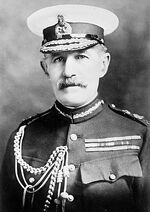
Horace Smith-Dorrien (26 May 1858 – 12 August 1930) was a British Army General during World War I. He commanded II Corps of the British Expeditionary Force at the Battle of Mons and the Second Battle of Ypres, after which he was relieved of command by his old rival John French due to his suggestion that the British withdraw to a better defensive position.
Biography[]
Horace Lockwood Smith-Dorrien was born in Berkhamsted, Hertfordshire, England on 26 May 1858, and he graduated from the Royal Military College, Sandhurst in 1877. He served as a British Army transport officer during the Anglo-Zulu War, and he was one of the few survivors of the Battle of Isandhlwana in 1879. He was promoted to Captain in 1882 while serving in Egypt, and he forged a lifelong friendship with Herbert Kitchener. In 1892, he was promoted to Major while he was posted to British India, and he returned to Egypt in 1898, when he was promoted to Lieutenant-Colonel; he fought at the Battle of Omdurman that same year. In 1900, he was promoted to Major-General and given a divisional command during the Second Boer War, and he was one of few British commanders to enhance his reputation during that war. In 1901, he was named Adjutant-General of India, and he commanded a division at Quetta, Baluchistan from 1903 to 1907; he was promoted to Lieutenant-General in 1906. His reforms during his service at Aldershot made him rivals with John French, who despised Smith-Dorrien for being popular among his soldiers. In 1911, he was made aide-de-camp to King George V, and he was given command of the Southern Department and promoted to General in 1912. In 1914, Smith-Dorrien was given command of II Corps, British Expeditionary Force (BEF) under his old rival John French, and he bravely led his corps in inflicting heavy losses on the numerically-superior German army at the Battle of Mons that same year. In the spring of 1915, he commanded the British 2nd Army at the Second Battle of Ypres, and he was relieved of command by French for requesting permission to retreat from the Ypres Salient to a more defensible position. In 1917, he was appointed lieutenant of the Tower of London, and he led a campaign in London for moral purity and called for the suppression of "suggestive or indecent" media. From 1918 to 1923, he served as Governor of Gibraltar, introducing an element of democracy and closing some brothels. He retired in 1923, living in Portugal and England. He died in a car accident in Chippenham in 1930 at the age of 72.
